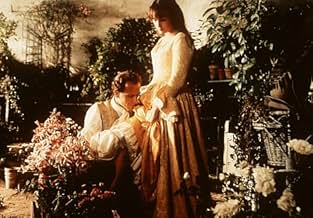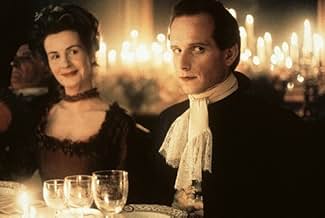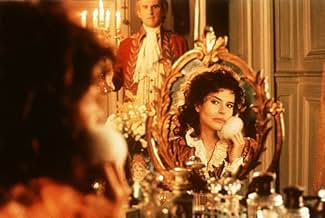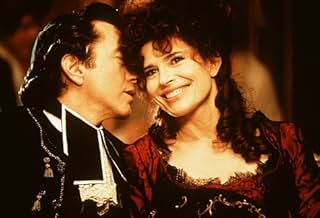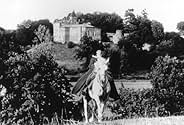Ridicule
- 1996
- Tous publics
- 1h 42min
NOTE IMDb
7,3/10
8,4 k
MA NOTE
Afin d'obtenir le soutien royal pour un projet de drainage nécessaire, un gentilhomme désargenté doit apprendre à manier les délicats mots d'esprit à la cour de Versailles.Afin d'obtenir le soutien royal pour un projet de drainage nécessaire, un gentilhomme désargenté doit apprendre à manier les délicats mots d'esprit à la cour de Versailles.Afin d'obtenir le soutien royal pour un projet de drainage nécessaire, un gentilhomme désargenté doit apprendre à manier les délicats mots d'esprit à la cour de Versailles.
- Réalisation
- Scénario
- Casting principal
- Nommé pour 1 Oscar
- 20 victoires et 17 nominations au total
Judith Godrèche
- Mathilde
- (as Judith Godreche)
Avis à la une
I have seen this film recently on video after having missed it at the cinema and on TV. I knew it would be all about cruelty of words and superficiality of elites. Indeed, this film is a true gem, very well played, sharp and quick. It tells the story of a young provincial nobleman discovering the Versailles Court as he tries to get funding for his project. What he finds will lead the nobility to its brutal end 6 years later: futility, self-conceit, disinterest to the people's problems, superficiality of relationships (all of which still pervade it modern French elite, to some respects as was evident from revelations of Mitterrand's shameful reign). Of course the political message is important. But equally if not more important -or pleasurable- are the dialogues. French can be so brutal, insidious, cruel, tortured, witty when used a propos that I'm not sure the non-French speakers could get the most of the dialogues. Certainly the absolutely brilliant rhymes contest would be somehow lost in English subtitles. A very good 9/10 for this movie, and a bit less if you don't get the dialogues.
10MarioB
This is a very very intelligent movie. From a historical point of view, it's perfect! It shows how cruel and vain the French noblesse was before the French Revolution of 1789, and why this country had a revolution! It's also a fantastic movie for the beauty of the French language. Actors are fabulous, with Berling, Rochefort and Ardant. For me, French cinema is always at it's peak when they're doing comedy of historical movies, like this one, or Beaumarchais l'insolent, Marquise, or Cyrano de Bergerac. By the way, I'd like to tell Thefan-2 of Detroit that the Ridicule of the title don't mean Ridiculous. In the Renaissance French language, it means Hard. And that's what is facing Berling, when he wants to get in touch the king to help the poor people of his land.
10moulya
Patrice Leconte's most achieved feature. The scenario mixes wit, cruelty, finest ferocious humor, politics and romance with a rare balance. Rhythm is fast, and the movie is served by a wonderful cast (many actors are among the best stage actors in France), notably main character Charles Berling and Bernard Gireaudeau's abbe de Villecourt. Jean Rochefort's supporting performance is outstanding, as is the impersonation of a Versailles court's bird of prey by Fanny Ardant. All in all, i.m.h.o., one of the best French movies of the 90s.
Ridicule deals with the consequences of a monarch or ruler running his empire according to his own personal interests, rather than concern for the greater good of the people. There were also a couple of underlying themes, such as the distribution of social classes overall and the ignorance of the upper classes, as well as the human suffering that comes as a result of arrogance, ego, and social status. A romantic conflict was a significant part of the story, dealing with the pain and guilt that someone may feel from seducing one person for manipulative purposes and actually being in love with a different person.
The story is of a man named Ponceludon de Malavoy who needs to drain a mosquito and disease infested swamp, but he needs King Louis XVI's help to do it. He travels to Versailles, but finds that he needs to have the sharpest of all wits in order for the king to recognize his problem at all. He finds himself in a society driven almost exclusively by the measure of each person's wit (or `hew-mah,' as they heard it was called in English), and the seriousness of Ponceludon's plight was second to this point, if it is noticed at all. It was more important to King Louis XVI to be entertained than it was to drain a swamp that was causing sickness and death even among children.
One scene in particular was very effective in demonstrating the ignorance of the upper class. There was a boy named Paul who was a deaf-mute, and seen as a `half-wit' by the upper class people. Obviously, in this society this is the last thing that anyone wants to be. He is exiled from the kingdom, sent to live with other half-wits,' only to return later with several other deaf-mutes after having learned to communicate using sign language. They are introduced to the upper class members, who are skeptical about the worth of the half-wits' lives. When they see that these kids are able to communicate, they are noticeably impressed. They even give them a standing applaud when one of them manages to make a `play on signs.' They see that these kids are not only intelligent enough to communicate, but can even be witty using sign language, and this completely changes their view. They had always seen people like Paul as less important, simply because they are not able to speak or hear, which is clearly a symptom of classical ignorance.
Ridicule is a period film, and it was very effective in illustrating the differences between elements of society today and of the society of 1793. Obviously, honesty is very highly valued today. A recent survey showed that honesty is the third thing that women truly desire in a relationship (preceded by affection at No.1 and conversation at No.2). The same survey showed sex to be Number one on men's importance list, and this completes one of the sharpest contrasts seen in Ridicule. Ponceludon de Malavoy, the man seeking to have his swamp drained, is engaging in a sexual relationship with Marquis de Bellegarde, an attractive older woman of much higher social status (!!). When he informs her of his lack of emotional feelings for her, she responds in a way that, in my opinion, is exactly the opposite of the way a woman today would respond, by literally telling him to lie to her. She tells him, `Learn to hide your insincerity so that I can yield without dishonor.' Aside from the fact that this shows that she would rather be bedded than loved, at least by Ponceludon, it also enhances the drama caused by his love for someone else, and his obvious feelings of guilt about sleeping with another woman. Ponceludon does not love her, but knows that she is capable of improving his chances of getting help from the king.
Ponceludon, despite having sexual relations with Marquis de Bellegarde, the older upper class woman, is in love with a simpler, poorer woman named Mathilde. She develops very strong feelings for him as well, but she is engaged to a very old, very rich man. She is determined to remain engaged to him, even though he is currently married to another woman, so that he may finance her scuba diving interests. The fact that Ponceludon and Mathilde are both engaged in strikingly similar manipulative relationships makes their love for each other even more effective.
There were dancing scenes later in the film where everyone wears masks and huge elaborate wigs, which demonstrated a dire need to be accepted. The fact that all of the wigs and masks worn in this scene were strikingly similar suggested that these people desired to be as much like everyone else as possible, and that individuality is discouraged. The men wore white powder on their faces, blush on their cheeks, and even distinct amounts of lipstick. Aside from being another way of illustrating conformity, it also poses a huge difference between then and now. In today's society, men who wear that much make-up are most often the ones who are actually trying NOT to fit in with the general population.
One other thing that is worth mentioning is the fact that the exact words or topics spoken in the film are far less important than the way that they are said. Body language as well as things like costuming and make-up are far more important than the exact subjects that were spoken of. This was most effectively communicated to the audience by the fact that there were a few scenes where the French conversation was not subtitled. This forced the audience, particularly the English speaking audience, to focus more on the way the characters were speaking to each other rather than what exactly they were saying. This is very unusual, but is also noteworthy because it successfully furthers the meaning delivered by the film.
The story is of a man named Ponceludon de Malavoy who needs to drain a mosquito and disease infested swamp, but he needs King Louis XVI's help to do it. He travels to Versailles, but finds that he needs to have the sharpest of all wits in order for the king to recognize his problem at all. He finds himself in a society driven almost exclusively by the measure of each person's wit (or `hew-mah,' as they heard it was called in English), and the seriousness of Ponceludon's plight was second to this point, if it is noticed at all. It was more important to King Louis XVI to be entertained than it was to drain a swamp that was causing sickness and death even among children.
One scene in particular was very effective in demonstrating the ignorance of the upper class. There was a boy named Paul who was a deaf-mute, and seen as a `half-wit' by the upper class people. Obviously, in this society this is the last thing that anyone wants to be. He is exiled from the kingdom, sent to live with other half-wits,' only to return later with several other deaf-mutes after having learned to communicate using sign language. They are introduced to the upper class members, who are skeptical about the worth of the half-wits' lives. When they see that these kids are able to communicate, they are noticeably impressed. They even give them a standing applaud when one of them manages to make a `play on signs.' They see that these kids are not only intelligent enough to communicate, but can even be witty using sign language, and this completely changes their view. They had always seen people like Paul as less important, simply because they are not able to speak or hear, which is clearly a symptom of classical ignorance.
Ridicule is a period film, and it was very effective in illustrating the differences between elements of society today and of the society of 1793. Obviously, honesty is very highly valued today. A recent survey showed that honesty is the third thing that women truly desire in a relationship (preceded by affection at No.1 and conversation at No.2). The same survey showed sex to be Number one on men's importance list, and this completes one of the sharpest contrasts seen in Ridicule. Ponceludon de Malavoy, the man seeking to have his swamp drained, is engaging in a sexual relationship with Marquis de Bellegarde, an attractive older woman of much higher social status (!!). When he informs her of his lack of emotional feelings for her, she responds in a way that, in my opinion, is exactly the opposite of the way a woman today would respond, by literally telling him to lie to her. She tells him, `Learn to hide your insincerity so that I can yield without dishonor.' Aside from the fact that this shows that she would rather be bedded than loved, at least by Ponceludon, it also enhances the drama caused by his love for someone else, and his obvious feelings of guilt about sleeping with another woman. Ponceludon does not love her, but knows that she is capable of improving his chances of getting help from the king.
Ponceludon, despite having sexual relations with Marquis de Bellegarde, the older upper class woman, is in love with a simpler, poorer woman named Mathilde. She develops very strong feelings for him as well, but she is engaged to a very old, very rich man. She is determined to remain engaged to him, even though he is currently married to another woman, so that he may finance her scuba diving interests. The fact that Ponceludon and Mathilde are both engaged in strikingly similar manipulative relationships makes their love for each other even more effective.
There were dancing scenes later in the film where everyone wears masks and huge elaborate wigs, which demonstrated a dire need to be accepted. The fact that all of the wigs and masks worn in this scene were strikingly similar suggested that these people desired to be as much like everyone else as possible, and that individuality is discouraged. The men wore white powder on their faces, blush on their cheeks, and even distinct amounts of lipstick. Aside from being another way of illustrating conformity, it also poses a huge difference between then and now. In today's society, men who wear that much make-up are most often the ones who are actually trying NOT to fit in with the general population.
One other thing that is worth mentioning is the fact that the exact words or topics spoken in the film are far less important than the way that they are said. Body language as well as things like costuming and make-up are far more important than the exact subjects that were spoken of. This was most effectively communicated to the audience by the fact that there were a few scenes where the French conversation was not subtitled. This forced the audience, particularly the English speaking audience, to focus more on the way the characters were speaking to each other rather than what exactly they were saying. This is very unusual, but is also noteworthy because it successfully furthers the meaning delivered by the film.
This reminds me a lot of Dangerous Liaisons (1988) and Valmont (1989) in its cynicism and sharp wit. Set in France during the same time period (the eve of the French Revolution--that's the eighteenth century, reviewers), Ridicule concentrates not so much on sexual intrigues (although there is plenty of that) but on cynical wit as though in homage to Voltaire, France's master of satire whose spirit is suffused throughout.
First a warning. Don't let the rather gross crudity of the opening scene mislead you. That is meant merely as satire, not as a presaging of further crudities to come. It is also meant as a kind of cinematic joke since there is no comparable female nudity in the entire film. Indeed, there is no comparable, shall we say "expression," anywhere in legitimate filmdom that I am aware of. So let it pass or close your eyes.
Charles Berling stars as Gregoire Ponceludon de Malavoy, a country engineer who comes to Versailles to get financial backing to drain a swamp to save the peasants who are dying of mosquito-borne disease. ("Peasants feed aristocrats as well as mosquitos.") He discovers very quickly that a way to an audience with Louis XVI is through gaining a reputation as a clever courtier. Guided by M. Bellegarde (Jean Rochefort), a retired courtier himself, Ponceludon quickly picks up the games of wit and ridicule that reign at court. His quick and clever mind and youthful good looks gain the attention of the king's mistress, Madame de Blayac (Fanny Ardant) who demonstrates how access to the king can come through her bedroom. Ponceludon is sincere only in his desire to drain the swamp and so readily allows himself to become another of Blayac's lovers in exchange for a chance to present his program to Louis XVI.
At the same time he meets Bellegarde's daughter Mathide (Judith Godrèche), an idealistic beauty with a scientific bent, who is betrothed to a dying old man of wealth and position. They fall in love, but their differing agendas keep them apart.
What makes this film such a delight is the delicious way it satirizes the decadent court of Louis XVI. The dramatic irony is superb and absolute in the sense that at no time does director Patrice Leconte give even the slightest hint that any of the byzantine sycophants at court are aware that Danton and the Terror await them. Throw in the impending Industrial (and scientific) Revolution symbolized in the form of Ponceludon and Mathide, and the ancien régime with its antiquated feudal titles and corrupt privilege is seen for what it was, a parasitic anachronism, ripe to rot for destruction.
The sets, the direction and especially the acting are excellent. Veteran Rochefort is particularly good in a part that depends on a directive and expressive face amid the whispers at court. Berling is smooth and believable as a man with a noble mission, adroit at repartee, love and dueling, a modest and earnest hero.
Godrèche is good, but seems a little restrained here. She is an impossibly healthy, handsome beauty no man could resist. I first saw her as a 17-year-old in The Disenchanted (1990) where her adolescent charm was carefully and craftily displayed by director Benoît Jacquot. Here Leconte concentrates on her strength of character.
Fanny Ardant's Madame de Blayac is a Machiavellian mistress of love's duplicity, very much like the Marquise de Merteuil from Dangerous Liaisons and Valmont. Her performance compares favorably with that of Glenn Close and Annette Bening, respectively, although there is an earthy quality to Ardant that seems most realistic. Her character is also more vulnerable.
The sets are sumptuous without being artificially showy. The gray, high-topped wigs and the beaked-nosed masks at ball are charming and, along with the gilded attire, the caked makeup, etc., somehow suggest the true state of costume and personal hygiene circa 1784, reminding me that in those days people did not generally wear underpants or take showers.
Some bon mots:
"The soul of wit is to know one's place."
When asked by the king to say something witty about the king himself, Ponceludon returns: "The king is not a subject." The king asks if this is not a (lowly) pun, but is assured that it is a "play on words."
When Blayac discerns that Ponceludon is not entirely smitten with her, she responds, "Learn to hide your insincerity so that I may yield without dishonor."
The film closes with a scene in England on a cliff overlooking the English channel. Bellegarde and another reflect on the changes after the revolution: "Wit was the very air we breathed." "Now the bloated rhetoric of Danton rules in place of wit." Bellegarde's hat is blown off by the wind. His companion remarks: "Better your hat than your head."
By the way, the subtitles (and this is usually not the case) are excellent, inventive and faithful enough, while comfortably brief, to have been done by a professional translator instead of by someone handy who is passably bilingual.
(Note: Over 500 of my movie reviews are now available in my book "Cut to the Chaise Lounge or I Can't Believe I Swallowed the Remote!" Get it at Amazon!)
First a warning. Don't let the rather gross crudity of the opening scene mislead you. That is meant merely as satire, not as a presaging of further crudities to come. It is also meant as a kind of cinematic joke since there is no comparable female nudity in the entire film. Indeed, there is no comparable, shall we say "expression," anywhere in legitimate filmdom that I am aware of. So let it pass or close your eyes.
Charles Berling stars as Gregoire Ponceludon de Malavoy, a country engineer who comes to Versailles to get financial backing to drain a swamp to save the peasants who are dying of mosquito-borne disease. ("Peasants feed aristocrats as well as mosquitos.") He discovers very quickly that a way to an audience with Louis XVI is through gaining a reputation as a clever courtier. Guided by M. Bellegarde (Jean Rochefort), a retired courtier himself, Ponceludon quickly picks up the games of wit and ridicule that reign at court. His quick and clever mind and youthful good looks gain the attention of the king's mistress, Madame de Blayac (Fanny Ardant) who demonstrates how access to the king can come through her bedroom. Ponceludon is sincere only in his desire to drain the swamp and so readily allows himself to become another of Blayac's lovers in exchange for a chance to present his program to Louis XVI.
At the same time he meets Bellegarde's daughter Mathide (Judith Godrèche), an idealistic beauty with a scientific bent, who is betrothed to a dying old man of wealth and position. They fall in love, but their differing agendas keep them apart.
What makes this film such a delight is the delicious way it satirizes the decadent court of Louis XVI. The dramatic irony is superb and absolute in the sense that at no time does director Patrice Leconte give even the slightest hint that any of the byzantine sycophants at court are aware that Danton and the Terror await them. Throw in the impending Industrial (and scientific) Revolution symbolized in the form of Ponceludon and Mathide, and the ancien régime with its antiquated feudal titles and corrupt privilege is seen for what it was, a parasitic anachronism, ripe to rot for destruction.
The sets, the direction and especially the acting are excellent. Veteran Rochefort is particularly good in a part that depends on a directive and expressive face amid the whispers at court. Berling is smooth and believable as a man with a noble mission, adroit at repartee, love and dueling, a modest and earnest hero.
Godrèche is good, but seems a little restrained here. She is an impossibly healthy, handsome beauty no man could resist. I first saw her as a 17-year-old in The Disenchanted (1990) where her adolescent charm was carefully and craftily displayed by director Benoît Jacquot. Here Leconte concentrates on her strength of character.
Fanny Ardant's Madame de Blayac is a Machiavellian mistress of love's duplicity, very much like the Marquise de Merteuil from Dangerous Liaisons and Valmont. Her performance compares favorably with that of Glenn Close and Annette Bening, respectively, although there is an earthy quality to Ardant that seems most realistic. Her character is also more vulnerable.
The sets are sumptuous without being artificially showy. The gray, high-topped wigs and the beaked-nosed masks at ball are charming and, along with the gilded attire, the caked makeup, etc., somehow suggest the true state of costume and personal hygiene circa 1784, reminding me that in those days people did not generally wear underpants or take showers.
Some bon mots:
"The soul of wit is to know one's place."
When asked by the king to say something witty about the king himself, Ponceludon returns: "The king is not a subject." The king asks if this is not a (lowly) pun, but is assured that it is a "play on words."
When Blayac discerns that Ponceludon is not entirely smitten with her, she responds, "Learn to hide your insincerity so that I may yield without dishonor."
The film closes with a scene in England on a cliff overlooking the English channel. Bellegarde and another reflect on the changes after the revolution: "Wit was the very air we breathed." "Now the bloated rhetoric of Danton rules in place of wit." Bellegarde's hat is blown off by the wind. His companion remarks: "Better your hat than your head."
By the way, the subtitles (and this is usually not the case) are excellent, inventive and faithful enough, while comfortably brief, to have been done by a professional translator instead of by someone handy who is passably bilingual.
(Note: Over 500 of my movie reviews are now available in my book "Cut to the Chaise Lounge or I Can't Believe I Swallowed the Remote!" Get it at Amazon!)
Le saviez-vous
- AnecdotesIt is worth noting the presence of a real historical figure, father Charles Michel de l'Épée. The abbot de l'Épée was one of the first to take an interest in the issue of public education for the deaf, giving priority to sign language as a language of instruction.
- GaffesAround 44 min, when Grégoire is talking with Madame de Blayac, her left hand is touching the table, but in the next shot it's just hanging on the chair's the armrest.
- Citations
Gregoire Ponceludon de Malavoy: Peasants feed aristocrats as well as mosquitoes.
Meilleurs choix
Connectez-vous pour évaluer et suivre la liste de favoris afin de recevoir des recommandations personnalisées
- How long is Ridicule?Alimenté par Alexa
Détails
- Date de sortie
- Pays d’origine
- Langue
- Aussi connu sous le nom de
- Насмішка
- Lieux de tournage
- Parc du Château de Versailles, Versailles, Yvelines, France(palace garden and ponds)
- Sociétés de production
- Voir plus de crédits d'entreprise sur IMDbPro
Box-office
- Budget
- 50 000 000 F (estimé)
- Montant brut aux États-Unis et au Canada
- 1 979 768 $US
- Montant brut mondial
- 1 979 768 $US
Contribuer à cette page
Suggérer une modification ou ajouter du contenu manquant



